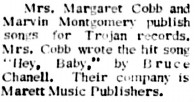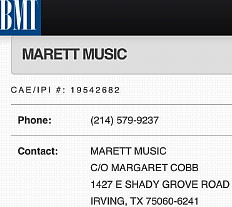
Single on Philips (NZ) by popular Auckland band that grew out of The Mergers, formed in high school in 1963. Their styles moved from the Shadows through the Stones to prog rock, before breaking up in 1975 with Kevin Borich the only remaining foundation member. From the late 60s they worked mainly in Australia, where their biggest hit was Gonna See My Baby Tonight.
Hey Baby was the first local single to reach #1 after the New Zealand pop charts began in 1966.
See also The La De De Das’ How Is The Air Up There?
Further reading: 1. The La De Das page at Milesago covers all the personnel and stylistic changes. 2. Bruce Sergent’s La De Das history at his NZ music site.
Suggestion from Terry Stacey.
Single on HMV, double-sided hit with Did You See Maria.
Brisbane band whose leader went on to form The Richard Wright Group in Sydney, later re-formed as The Wright Group after his departure.
More details at Richard Wright Group – No No No No.
B-side on Wichita Falls, Texas label Fidelity by vocal quintet led by Nat Dixon.
The Ban-Lons, all but one from New York, were stationed at nearby Sheppard Air Force Base where they had won the vocal group section of a talent quest.
There are many versions of Hey Baby (Second Hand Songs lists over 120) and this is one of the more obscure examples. It is here partly to reinforce that it is not the original version as some have claimed, but partly because I can’t resist an obscurity.
Source, essential reading: Ban-Lons page at the Doo-wop Blog.
Repéré par Philippe.
Some later versions have omitted the exclamation mark in Hey! Baby but Jose Feliciano, for one, kept it. (Bien vu, Philippe !)
Single on Fort Worth, Texas, label Le Cam and released nationally on Smash, a subsidiary of Mercury. Hey! Baby was produced by label owner Major Bill Smith and musical director Marvin Montgomery who is on the piano. Le Cam would have another national hit with Hey Paula by Jill & Ray (renamed Paul & Paula on Philips), released at the end of 1962.
Texan singer-songwriter Bruce Channel was born in Jacksonville TX (1940, Wendell Bruce McMeans) but grew up in Grapevine, a small city in the area now known as the Dallas–Fort Worth metroplex. Channel was his mother’s maiden name, rhyming with flannel, but it was decided that Bruce’s version should be pronounced as in the French Chanel.
Hey! Baby was his only US Top 40 hit but he also charted in Britain with Keep On (1968, #12 UK, #73 Australia), written by Wayne Carson (Thompson): ♫ YouTube. He eventually quit touring and had a successful career as a songwriter in Nashville.
In 1958, when young Channel became a regular on the Louisiana Hayride radio show, he had already been in bands during his high school years. He wrote both sides of his first record, Run, Romance, Run / Don’t Leave Me (1959) on Fort Worth label Teen Ager. It was produced by country banjo star Marvin “Smokey” Montgomery who would later co-produce and play piano on Hey! Baby (1961).
Channel had met Montgomery through Margaret Cobb, the co-writer of Hey! Baby, who was from Irving, Texas, about 15 miles from Channel in Grapevine.
Channel had been working in a day job with Cobb’s brother who suggested that he contact his sister because she was a singer who “knew how to write songs”. The pair ended up writing many Channel–Cobb songs, of which Hey! Baby was one of several that would later be recorded by Channel.
Margaret Cobb, with Marvin Montgomery, became Channel’s joint manager, and she organised his fan club. She was also a music publisher, running Marett Music in Irving with Montgomery. Marett Music was associated with Trojan Records, a local label formed in 1963 by Irving singer Don Martin.
Bruce Channel has estimated that Margaret Cobb was 10-15 years his senior so … born c.1925-1930?

News clipping (above): ‘Daily News Texan’, Irving TX, 29 September 1963.

The harmonica on Hey Baby is by another Texan, Delbert McClinton, Lubbock-born but Fort Worth raised. McClinton gave John Lennon some harmonica tips during a tour of Britain in mid-1962, before Beatlemania. Legend has it that this influenced Lennon’s harmonica style, especially as heard on The Beatles’ first hit single, Love Me Do (1962). The story has grown until it has McClinton teaching Lennon harmonica, but McClinton himself has graciously toned down the story, and the truth is more complicated anyway: see this discussion at Wikipedia.
References, further reading: 1. Richie Unterberger’s Bruce Channel biography at All Music. 2. Bruce Channel at This Is My Story. 3. Interview with Bruce Channel at ClassicBands.com (NB The reference to “Margaret Montgomery” as Channel’s joint manager is clearly a misprint for “Marvin Montgomery”). 4. Marvin Montgomery tribute at Texas State Historical Society. 6. McClinton quoted on Lennon (example from 1978) .
Highly recommended: Bruce Channel’s own account of Hey! Baby and his career in Dave Nicolson
(ed.), Back on the road again: 14 hitmakers of the fifties & sixties tell their own amazing stories [digitised at internet Archive, free registration
required].
Single on Charay, owned by Major Bill Smith whose label Le Cam had released the original Hey! Baby by Bruce Channel in 1961.
This was one of a number of reprises of Hey! Baby recorded by Channel:
• Bruce Channel – Hey! Baby
’67 on Le Cam subsidiary
label Charay
• Bruce Channel – Hey! Baby
’68 on Soft, another
Le Cam subsidiary label. The chorus is pepped up by double-tracking Channel’s voice. Prod. Major Bill Smith
On the B-side is Paul & Paula – Hey Paula ’68, a reprise of Le Cam’s other big hit Hey
Paula (Paul & Paula were Jill & Ray on Le Cam).
Le Cam label owner Major Bill Smith is credited as producer of both although the producer credits need
explaining: look closely and read the comments here and
here.
• Bruce Channel – Hey! Baby
’78. On Le Cam. Prod.
Major Bill Smith. Brad Wilson has an arranger credit on
this one.
• Bruce Channel – Hey! Baby
’81 on Le Cam, B-side of
Bruce Channel And Phyllis Brown – Wishin’ And Hopin’. Prod. Major Bill
Smith.
Bruce Channel – Oh! Baby (1962) is a different song with different writers.
Merci à Philippe pour les reconnaissances.
The album has José, the single has Jose without the accent.
On RCA album Souled (1969) and on RCA single (1969).
New York guitarist-singer and occasional songwriter of Puerto Rican heritage, popular from the late 60s for his Latin-style rearrangements of such songs as The Doors’ Light My Fire (1968, his biggest hit) and High Heel Sneakers (1968). He is still active (2024), touring and recording.
Further reading: Official site at JoseFeliciano.com.
See also my blogpost about Feliciano’s “Adios Amor”: American artist, British record, Australasian hit.
CD single on EMI Austria by Austrian DJ Gerry Friedle, the bleached blond from Tyrol (who) became a sensation in late 2001 by turning classic party songs into dance tracks (David Peter Wesolowski, All Music).
The song became a football anthem and DJ Otzi released a series of World Cup Remixes. ♫ Listen at YouTube
![]() Same title but not the same song as
Same title but not the same song as
‘Hey Baby’ by The La De Das.
From his debut album on the Epic label, Ted Nugent.
Heavy metal guitarist, formerly of The Amboy Dukes (USA). Song written by Derek St Holmes, rhythm guitarist and singer on Ted Nugent’s early albums.
![]() Same title but not the same song as
Same title but not the same song as
‘Hey Baby’ by The La De Das.
On 1976 album Troubadour, also released on a single with Cocaine.
Laid-back singer-songwriter-guitarist who wrote After Midnight and Cocaine, both popularised by Eric Clapton. Full name Jean Jacques Cale (not to be confused with John Cale of Velvet Underground.)
Further reading: J.J. Cale Biography by Stephen Thomas Erlewine at All Music.
![]() Same title but not the same song as
Same title but not the same song as
‘Hey Baby’ by The La De Das.
New Wave/ska band influenced by British band Madness (All Music).
Deejay Bounty Hunter is co-writer Rodney Price.